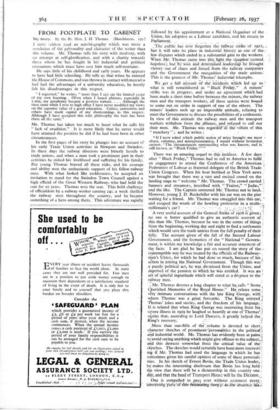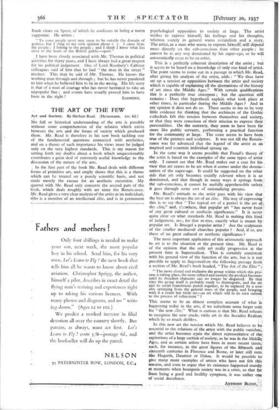FROM -FOOTPLATE TO CABINET
My Story. By the Rt. Hon. J. H. Thomas. (Hutchinson. ir5s.)
I HAVE seldom read an autobiography which was more a revelation of the personality and character of the writer than this volume. Mr. Thomas tells his story with modesty, with no attempt at self-glorification, and with a charity towards those whom he has fought in hig industrial and political encounters which must have cost him much self-restraint.
He says little of -his childhood and early years. He appears to have had little schoOling. He tells us that when he entered the House of Commons, and was thrown in contact with men who had had the advantages of a university education, he keenly felt his disadvantages in this respect.
" I regretted," he writes, " more than I can say the limited scope of my own learning. Often when I heard phrases, especially in Latin, my perplexity became a positive torture. . . . Although the time came when I rose to high office I have never modified my views on the supreme value of a good education. Critics, cartoonists and others have made capital of my shortcomings in this respect.. Although I have accepted- this with philosophy the hurt has been there all tiv: same."
Mr. Thomas has taken too much to heart what he calls his " lack of erudition." : It is more likely that he never would have attained the position he did if he had been born in other circumstances.
In the first pages of his story he plunges into an account of his early Trade Union activities in Newport and Swindon. In these days the railway directors were bitterly hostile to trade unions, and when a man took a prominent part in their activities he risked his livelihood and suffering for his family.
But young Thomas braved all these risks, and -his courage and ability won the enthusiastic support of his fellow railway men. With what looked like recklessness, he accepted an invitation to stand for the Swindon Town Council against a high official of the Great Western Railway, who had held the seat for 20 years. Thomas won the seat. This bold challenge of officialdom by a railway worker earning 24s. a week thrilled the railway men throughout the country, and he became something of a hero among thein. This adventure was rapidly followed by his appointment as a National Organiser of the Union, his adoption as a Labour candidate, and his return to Parliament.
;The public has now forgotten the 'railway strike of r9rr;__ but it will take its place in industrial history as one of the!
few disputes which ended in a substantial gain to the workers. When Mr. Thomas came into thisi_fight,the sipiation'. seamed, hoPeless"; but:b3F wise deterrnmeeldeadership- he hi-Ought victory out of chaos and forced from the ,railway companies and the Government the recognition of the trade unions.'
This is the greatest of Mr. Thomas' industrial triumphs.
We get a full ACcomit of- the incidents which led up to what is still remen'thered as "-Black'. Priiiiir." A miners' strike was in progress, and under an agreement which had been made a short time before between the miners, the railway men and the transport workers, all three unions were bound, - to come out on strike in support of one of the Others. The miners' leaders took up an impossible attitude, refusing to meet the Government to discuss the possibilities of a settlement. In view of this attitude the railway men and the transport workers withdrew from the alliance, and' refused to call out their men: Mr. 'Monis was regarded'al-tgis,villain of this " treachery " ; and he writes : `, If I were asked which public action of mine brought me most • abuse, calumny, and misrepresentation, I would without hesitation answer, 'The circumstances surrounding what was known, and is still known, as "Black Friday."'"
There was an amusing sequel to this incident. A few days : after " Black Friday," Thomas had to sail to America to fulfil an engagement to attend the Conference of the American Federation of Labour as fraternal delegate of the. British Trade Union Congress. When his boat berthed at New York news was brought that there was a vast and excited crowd on the landing stage to " welcome " Mr. Thomas. The crowd carried banners and streamers, inscribed with “ Traitor," " Judas,"T; and the like. The Captain entreated Mr. Thomas not to land, However, young J. D. Rockefeller with his car was on the pier waiting for a friend. Mr. Thomas was smuggled into this car, and escaped the wrath of the howling proletariat in a multi-,- millionaire's Vicar ! - 7 - J or Zoi A very useful account of the General Strike of 1926 is given; no one is better qualified- to give an authentic account of this than Mr. Thomas, because he was in the centre of things from the beginning, working day and night to find a settlement ,• which would save the trade unions from the full penalty of their folly. The account given of -the fall of the -Second Labour - Government, and the formation of the "National " Govern- ment, is within my knowledge a fair and accurate statement of • the facts. I am glad he has put on record the -story of the—. contemptible way he was treated by the officials of the Railway- _ men's Union, for which he had done so much, because of his action in joining the National Government. Though this was - a purely political act, he was dismissed from the Union, and deprived of the pension to he-was entitled. It was an arZt of spiteful ingratitude which will stand as a disgrace to the railway men: Mr. Thomas devotes a long chapter to wkat he calls " Some Cherished Memories of the Royal House." He relates some very intimate conversations with the lite King George, with:: whom Thomas was a great favourite. The King enjoyed„. Thomas' jokes and stories, and the freedom , of, his language. If. is related that when King George was recovering from Ida,: severe illness in 1929 he laughed so heartily at one of Thomasq swnes that, according to Lord Dawson, it greatly helped they King's recovery. .
More than one-fifth of the volume is devoted to short character sketches of prominent personalities in the politicari and industrial world. Mr. Thomas has evidently been at paint.; L. to avoid saying anything whikh might give offence to the subject,.t and this detracts somewhat from the critical value of the; sketches. The sketches would certainly have been more interestzt ing if Mr. Thomas had.-used the language in which he has sometimes given his candid opinion of some of these personal: ides. In his sketch of Ernest Bevin, the Trade Union leader, hi makes the interesting disclosure. that Bevin has long held the view that there will be a dictatorship in this country one.; day, and that the head of Transport House will be the Dictator: One is compelled to past over without comment many;? intettstirig ftstinatingliO4-44.41sinsriact:---14,4 frank views on Sport, of which he confesses to being a warm supporter. He writes :
" To some people sport may seem to be outside the domain of politics, but I cling to my own opinion about a. 1. I came from the people ; I belong to the people' and I think I know what lies close to the heart of the British public—sport."
I have been closely associated with Mr. Thomas in political activities for thirty years, and I have always had a great respect fOr his political judgement. One. of Lord Rosebery's Cabinet colleagues said of him that he had " the man in the street ." instinct. This may be said of Mr. Thomas. He knows the working man through and through ; but he has never pandered
to him when he _believed him to be in the wrong. His life story is .that of a man of courage who has never hesitated to take an unpOpular line ; and events have usually proved him to have



















































 Previous page
Previous page